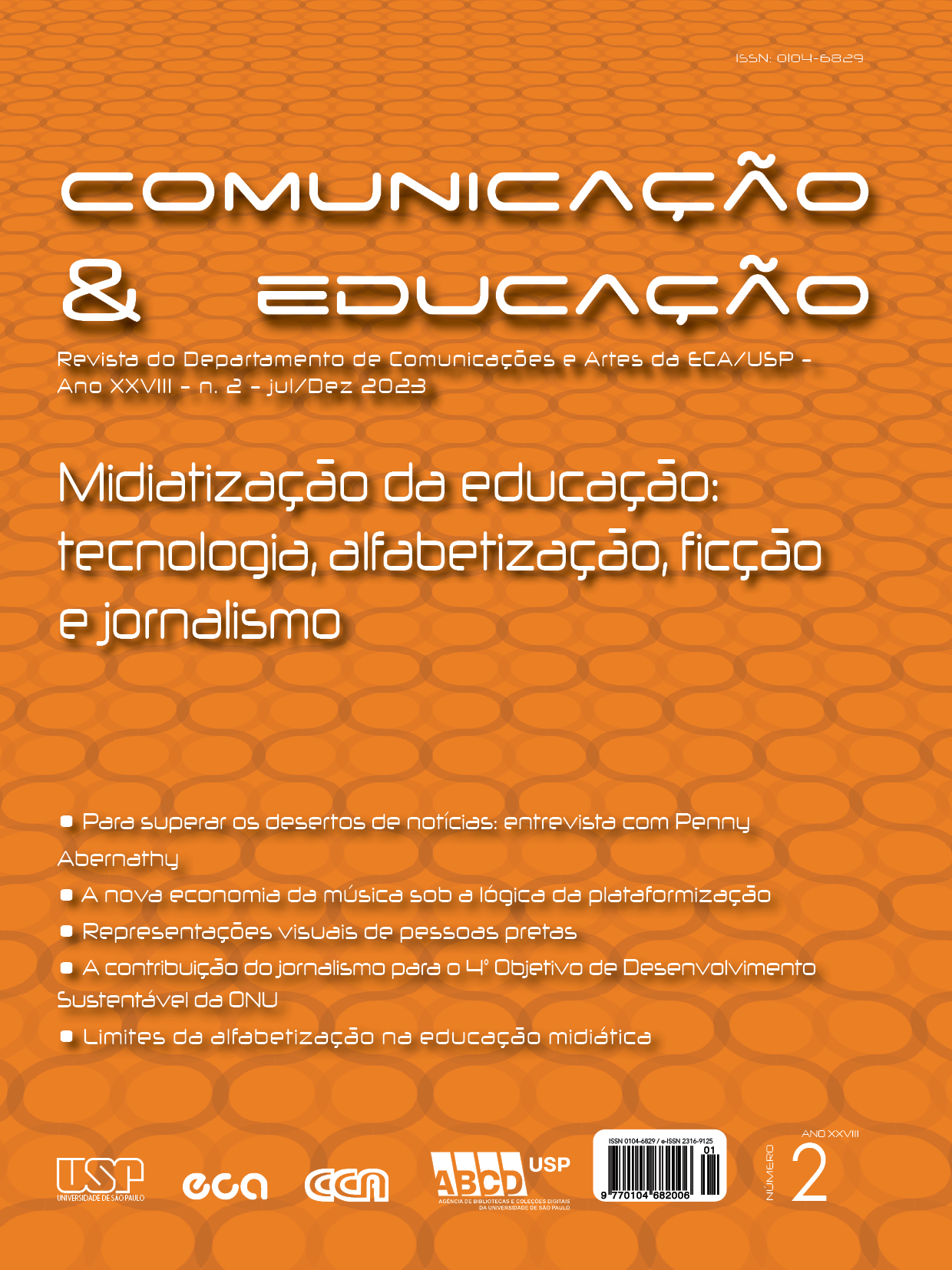Deconstructing technological mediations
DOI:
https://doi.org/10.11606/issn.2316-9125.v28i2p7-19Keywords:
communications, deconstruction, education, modulation, digital platformsAbstract
In this text, we reflect on the mediation processes and refrain from concentrating on singular actions and the involvement of numerous agents. We present, thus, partial results of a bibliographical research on the notion of technological mediations. We draw on discussions of digital culture, interaction, the interface between communication and education, and the notion of deconstruction, without defining “mediation”. By associating communication and deconstruction, we understand that the discussion goes beyond the human-machine relationship. Since such a relationship is constantly in motion, our focus shifts from technological mediation to mediations. Finally, we understand that human and non-human agents are interconnected in the teaching-learning process. Therefore, this process does occur through mediation (whether technological or pedagogical) but through mediations, in the plural.
Downloads
References
ABREU, Luis Felipe Silveira de; COLLING, Giovana dos Passos; SILVA, Alexandre Rocha da. A estrutura grafemática da comunicação: notas de um pensamento comunicacional em Jacques Derrida. In: ENCONTRO ANUAL DA COMPÓS, 29., 2020, Campo Grande. Anais […]. Porto Alegre: UFRGS, 2020.
CASSINO, João Francisco. Modulação deleuzeana, modulação algorítmica e manipulação midiática. In: SOUZA, Joyce; AVELINO, Rodolfo; SILVEIRA, Sérgio Amadeu da (org.). A sociedade de controle: manipulação e modulação nas redes digitais. São Paulo: Hedra, 2018. p. 13-30.
DERRIDA, Jacques. Carta a um amigo japonês. Tradução de Érica Lima. In: OTTONI, Paulo. Tradução: a prática da diferença. 2. ed. Campinas: Ed. Unicamp, 2005. p. 21-27.
DERRIDA, Jacques. Gramatologia. Tradução de Miriam Schnaiderman e Renato Ianini Ribeiro. São Paulo: Perspectiva, 1973.
DERRIDA, Jacques. Posições. Tradução de Tomaz Tadeu da Silva. Belo Horizonte: Autêntica, 2001.
FREIRE, Paulo. Pedagogia da autonomia: saberes necessários à prática educativa. 12. ed. São Paulo: Paz e Terra, 1996.
FREIRE, Paulo. Professora sim, tia não: cartas a quem ousa ensinar. São Paulo: Olho d´Água, 1997.
LEMOS, André. A tecnologia é um vírus: pandemia e cultura digital. Porto Alegre: Sulina, 2021.
MARTÍN-BARBERO, Jesús. Dos meios às mediações: comunicação, cultura e hegemonia. Tradução de Ronald Polito e Sérgio Alcides. 6. ed. Rio de Janeiro: Editora UFRJ, 2009.
MOROZOV, Evgeny. Big tech: a ascensão dos dados e a morte da política. Tradução de Claudio Marcondes. São Paulo: Ubu, 2018.
NASCIMENTO, Evando. Derrida e a literatura: “notas” de literatura e filosofia nos textos da desconstrução. 3. ed. São Paulo: É Realizações, 2015.
PRIMO, Alex (org.). Interações em rede. Porto Alegre: Sulina, 2016.
PRIMO, Alex. Interação mediada por computador: comunicação, cibercultura, cognição. 2. ed. Porto Alegre: Sulina, 2008.
SALGADO, Tiago Barcelos Pereira. Sociologias pragmáticas e cultura digital. Salvador: EDUFBA, 2022.
SANTAELLA, Lucia; CARDOSO, Tarcísio. Mediação segundo Peirce e Latour. Revista do Programa de Pós-graduação em Comunicação da Universidade Federal de Juiz de Fora, Juiz de Fora, v. 14, n. 3, p. 5-21, 2020.
SAUSSURE, Ferdinand de. Curso de linguística geral. Tradução de Antônio Chelini, José Paulo Paes e Izidoro Blikstein. 28. ed. São Paulo: Cultrix, 2012.
SILVEIRA, Sérgio Amadeu da. A noção de modulação e os sistemas algorítmicos. In: SOUZA, Joyce; AVELINO, Rodolfo; SILVEIRA, Sérgio Amadeu da (org.). A sociedade de controle: manipulação e modulação nas redes digitais. São Paulo: Hedra, 2018. p. 31-46.
SODRÉ, Muniz. Reinventando a educação: diversidade, descolonização e redes. Petrópolis: Vozes, 2012.
Downloads
Published
Issue
Section
License
Copyright (c) 2023 Rita Virgínia Alves Santos Argollo, José Pedro de Carvalho Neto

This work is licensed under a Creative Commons Attribution 4.0 International License.
I authorize the publication of the submitted article and soon the copyrights to the magazine, in the printed and electronic version, if it is approved after the evaluation of the reviewers.
I understand that readers may use this article without prior request, provided the source and authorship are mentioned. Readers are not authorized to use this article for reproduction, in whole or in part, for commercial purposes.

































